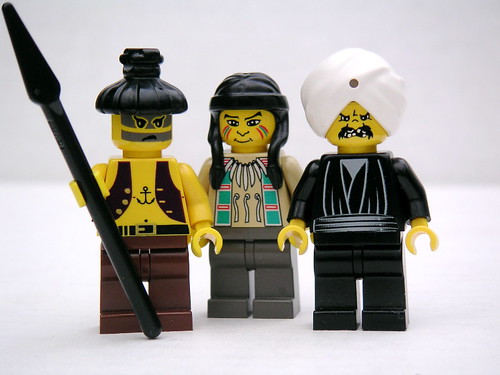Someone reminded me that
Queequeq isn't the only indigenous character in
Moby-Dick. The crew includes an actual Indian, Tashtego:
TashtegoTashtego is described as a Native American harpooneer. The personification of the hunter, he turns from hunting land animals to hunting whales. Tashtego is the harpooneer on Stubb's boat.
Next was Tashtego, an unmixed Indian from Gay Head, the most westerly promontory of Martha’s Vineyard, where there still exists the last remnant of a village of red men, which has long supplied the neighboring island of Nantucket with many of her most daring harpooneers. In the fishery, they usually go by the generic name of Gay-Headers.
—Moby-Dick, Ch.27Tashtego--Character AnalysisTashtego is a Native American from Gay Head, the westernmost point of Martha’s Vineyard, an island off the coast of Massachusetts. In Moby-Dick, he is presented as having inherited his hunting prowess as part of his tribal heritage.
Despite the (positive) racist stereotype behind this assumption (the idea of the "noble savage"), Tashtego’s character also illustrates the frustrating illogic of racism and racial hierarchies. As the harpooneer on Stubb’s whaling boat, it is Tashtego who strikes the first whale that we see killed in the novel--but the credit for the hunt and the kill goes entirely to Stubb.
It is also Tashtego who sights Moby Dick at the same moment that Captain Ahab does at the end of the novel--but Ahab insists he saw the White Whale first, denying Tashtego the promised reward of the gold doubloon.Comment: I don't recall if Melvilled described Tashtego as a savage, but people have pictured him as one. Wearing
warpaint...in a whaling ship? Going naked except for a loincloth...on the windy, stormy sea? A hawk-man...the Indian as a predatory animal? (For another example of this, see
Twilight.)
For more on the subject, see
Raoul Trujillo as Queequeg and
The Best Indian Books.
Below: Queequeg, Tashtego, and Fedallah.


George Klauba,
Tashtego, 2003, acrylic on panel.

Mark Milloff,
Quequeeg Rescues Tashtego From the Head of a Whale, oil on canvas, 1986.






Another taheen picture.
ReplyDelete